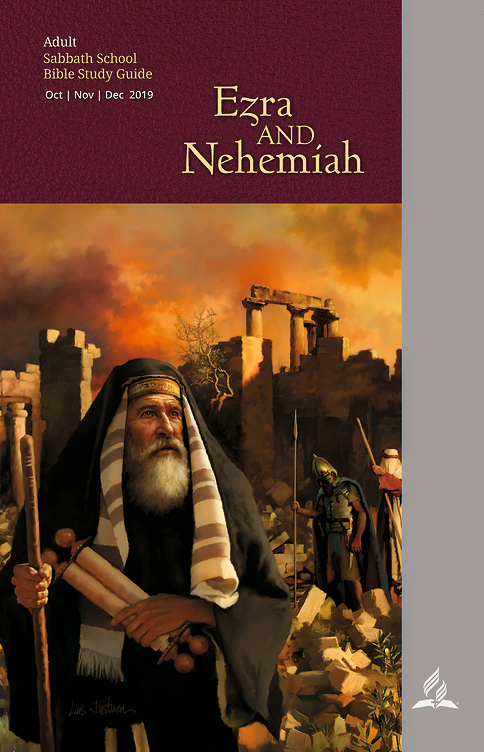Ezra and Nehemiah
The Gospel According to Ezra and Nehemiah

Ezra and Nehemiah were exceptional, God-centered, Word-oriented, and Spirit-led leaders who deeply desired that God’s people prosper and that His name be uplifted and proclaimed worldwide. Their lives modeled what God can do through dedicated, faithful servant leaders.
Because of our sinful natures, cultivated habits, and hereditary traits, we can experience true, lasting changes only through the study of God’s transforming Word and the assistance of the Holy Spirit. Believers live “not by might nor by power, but by My Spirit” (Zech. 4:6, NKJV)and by embracing God’s promises by faith (Hab. 2:4), resulting in a vibrant spiritual life.
This quarter’s lessons illustrate that life is complicated. As soon as we try to do good things, obstacles appear and opposition arises. Even friends may openly or secretly oppose us and, perhaps, become our enemies. Hurdles and resistance to good demonstrate that Satan is alive and that sin is real. Fighting Satan is humanly impossible because evil is stronger than we are. Only God can secure victory, revolutionize thinking, and give us power to live balanced lives. Life’s discouragements are opportunities for change. Disappointments may help us focus on essentials and accelerate our spiritual growth, as we obtain victory over each crisis through God’s empowerment.
Neither the book of Ezra nor Nehemiah ends with optimism. Sin is a serious matter, spreading easily and quickly. The biggest challenge does not come from outside, but from infidelity to God with His own people not following His revealed will. To be faithful to the Lord and persevere in following His instruction is the strongest test for God’s church. As Ezra correctly understood, the only power to change comes through diligently searching the Scriptures, comprehending, and internalizing them.
In order to fulfill the starting point of the prophecies of the 70 weeks and the 2,300 evenings and mornings (which both began in 457 B.C.), God graciously intervened and influenced King Artaxerxes I to allow Ezra along with a group of Israelites to return to Jerusalem, to secure the safety of their journey, and even to provide needed physical and financial provisions for the temple services (Ezra 7:11-28).
The key theological themes of these two books are God’s providence, faithfulness, and covenant. God fulfilled His promises, even though His people were narrow-minded, disoriented, distracted, and stubborn. Through His servants, He called them from their state of lethargy to revival and reformation.
“The work of restoration and reform carried on by the returned exiles, under the leadership of Zerubbabel, Ezra, and Nehemiah, presents a picture of a work of spiritual restoration that is to be wrought in the closing days of this earth’s history. The remnant of Israel were a feeble people, exposed to the ravages of their enemies; but through them God purposed to preserve in the earth a knowledge of Himself and of His law. They were the guardians of the true worship, the keepers of the holy oracles” - Ellen G. White, Prophets and Kings, p. 677.
Ezra and Nehemiah are historically linked, and they cover a crucial transition in the life of God’s people. These 23 chapters form one big story, but with subunits; they are complementary and cover similar theological issues. By carefully studying the pattern revealed in the composition of these two books, we can discern God’s great historical actions and gracious leadership.
Keep in mind that not everything presented in these books is written in chronological order, and that some parts are composed in a thematic manner.
As we will see, the challenge for Ezra and Nehemiah was not to reconstruct the temple (it was finished and dedicated in 515 B.C., more than 50 years before Ezra’s arrival) but to rebuild the city of Jerusalem, her administration, and the national autonomy — all eventually paving the way for the coming of the Messiah.
As we study God’s Word this quarter, may the Lord bless us by inspiring us, touching our hearts, transforming our thinking, and enabling us daily to follow Him faithfully and enthusiastically.
Jirí Moskala, ThD, PhD, is dean and professor of Old Testament exegesis and theology at the Seventh-day Adventist Theological Seminary at Andrews University. He joined the faculty in 1999. Prior to coming to Andrews, Moskala served in various capacities (ordained pastor, administrator, teacher, and principal) in the Czech Republic. He is a member of various theological societies and has authored or edited a number of articles and books in the Czech and English languages. In addition, he has participated in several archaeological expeditions at Tell Jalul, Jordan.
Video of the lesson presented by Pastor Doug Batchelor:
Video of the lesson presented by Dr Derek Norris:
The Teachers' Editions
Click on References below after the links to the lessons and before the cell phone signs for the verses of the week
Memory Text: “Thus says Cyrus king of Persia: All the kingdoms of the earth the LORD God of heaven has given me. And He has commanded me to build Him a house at Jerusalem which is in Judah”. (Ezra 1:2, NKJV).
This Quarter’s Study Contents: Ezra and Nehemiah
- Making Sense of History: Zerubbabel and Ezra • Sep 28 – Oct 4


- Nehemiah • October 5 – 11


- God’s Call• October 12-18


- Facing Opposition • October 19-25


- Violating the Spirit of the Law • Oct 26 – Nov 1


- The Reading of the Word- • Nov 2 – 8


- Our Forgiving God • Nov 9 – 15


- God and the Covenant• Nov 16 – 22


- Trials, Tribulations and Lists • Nov 23 – 29


- Worshiping the Lord • Nov 30 – Dec 6


- Backslidden People• Dec 7 – 13


- Dealing With Bad Decisions • Dec 14 – 20


- Leaders in Israel• Dec 21 – 27

